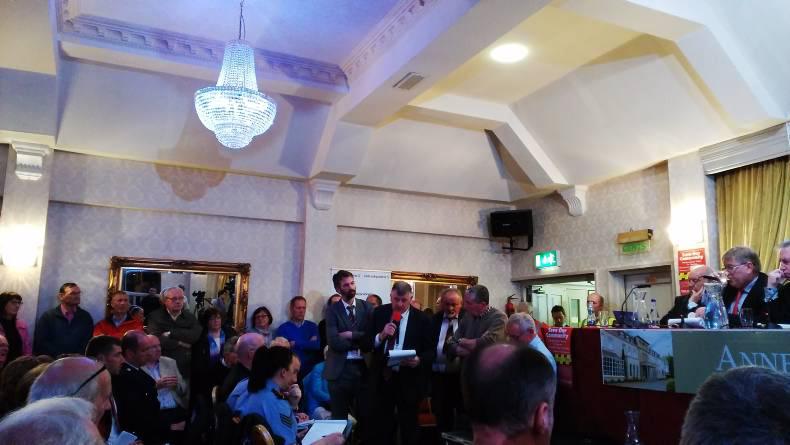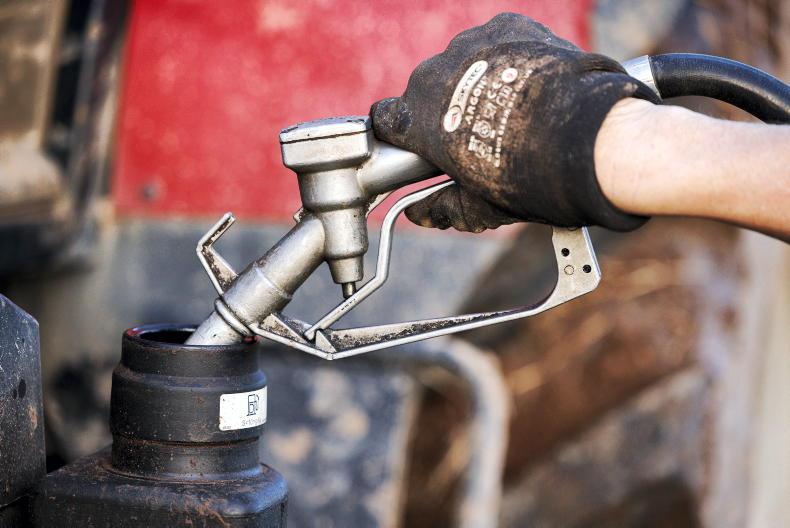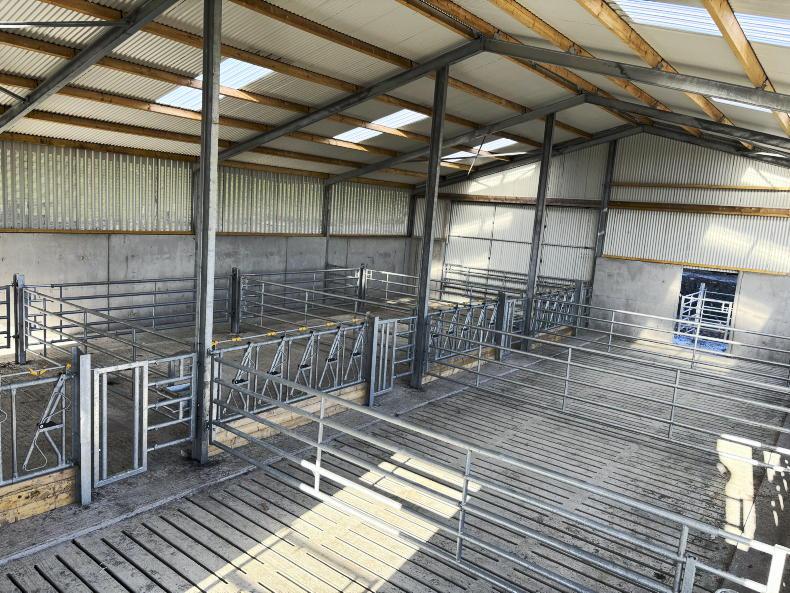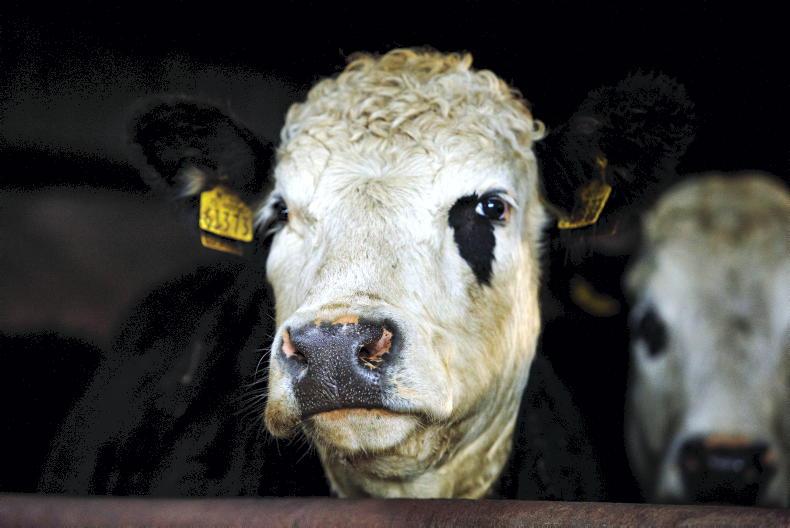Rural crime was firmly at the forefront of the public mind on Thursday night in Thurles, where an estimated 1,500 people attended the meeting “Save our Community” in the Anner Hotel.
Robert O’Shea, who went public following two robberies in his farmyard on successive nights, the first on the day he buried his mother, got the ball rolling. The massive public reaction when he shared his story last year in the Irish Farmers Journal began the momentum he addressed the crowd.
The place was packed, with the main meeting room full an hour beforehand. The overflow rooms also filled before the meeting started and speakers turned the lobby into a further relay area, meaning the Ireland/Germany match was drowned out.
It would be wrong to say that the impression from the meeting was of rural communities afraid for their safety. Some are undoubtedly afraid, but the dominant feeling was of frustration and growing anger that their property is not safe, no matter what precautions have been taken.
Local politicians of all shades were present and requested not to speak but to listen. The testimony of a succession of speakers in a charged atmosphere, quietly relaying their experiences, left no doubt that a watershed moment was at hand.
Using a quick show of hands, it was determined that 50% of people at the meeting knew their local guards 10 years ago, while less than 5% know them today.
Solicitor Kieran Cleary came to national prominence when representing the Corcoran family in a high profile case. “I’ve had a great life in Clonmel. My children have had a great life, but I’m terrified for my grandchildren,” he said. “We have to come together and say that this has got to stop now. It’s not drugs, it’s just gangsters.”
Kitty Lynch, from New Inn, heard the front door bang as she brought messages in through the back door. “Two years later, I’m still scared.”
Tom Sheedy, from Turtulla, said: “The amount of money spent on free legal aid for these thugs gets my goat. Everything is handed to them, the law is on their side.”
Barry O’Gorman, from Thurles, was burgled in both June and August of this year. He told the 1,500-strong crowd about small footprints following larger ones in the diesel under his tank, indicating that a small child was there helping when they should have been in bed. He feels like a prisoner in his own farm.
“We are living in a cell, having to lock gates all the time.”
Conor Moloney had a tractor battery stolen from his farm. While a battery may not be the most expensive item, the damage to the tractor’s electronics when removing it cost him €3,500 to repair. To stop this from happening again, he built an electric gate (which he called ‘‘Mountjoy gates’’) costing €10,000. However, on 13 August this year, €2,000 worth of tools was stolen from him and the robbers got into the yard through the ditch.
Maura Byrne, from Templemore, told everyone that her brother dismantles his machinery before he leaves his farmyard every evening. She lives with German Shepherds. “Call in the army, they’re there to serve the people,”she said.
Chief superintendent Catherine Kehoe said she has finite resources. In Tipperary, she has 351 gardaí and 31 in reserve. Assistant Commissioner Jack Nolan said that Ireland has a ratio of gardaí to citizens of 380:1, describing it as mid-range by international standards.
The audience responded negatively to this assertion, and the IFA’s Jer Bergin quickly countered that the Department of Agriculture has a much higher ratio of one to every 30 farmers, “and we’re honest people” to huge applause.
Proposals were discussed toward the end of the meeting and adopted. They encompassed broad principles rather than detailed proposals, and included:
Reform of bail laws.Electronic monitoring of repeat/habitual offenders.Reform of trespass laws.Monitoring of cash for gold/scrapyards/car boot sales.Collection of fines at source.
Rural crime was firmly at the forefront of the public mind on Thursday night in Thurles, where an estimated 1,500 people attended the meeting “Save our Community” in the Anner Hotel.
Robert O’Shea, who went public following two robberies in his farmyard on successive nights, the first on the day he buried his mother, got the ball rolling. The massive public reaction when he shared his story last year in the Irish Farmers Journal began the momentum he addressed the crowd.
The place was packed, with the main meeting room full an hour beforehand. The overflow rooms also filled before the meeting started and speakers turned the lobby into a further relay area, meaning the Ireland/Germany match was drowned out.
It would be wrong to say that the impression from the meeting was of rural communities afraid for their safety. Some are undoubtedly afraid, but the dominant feeling was of frustration and growing anger that their property is not safe, no matter what precautions have been taken.
Local politicians of all shades were present and requested not to speak but to listen. The testimony of a succession of speakers in a charged atmosphere, quietly relaying their experiences, left no doubt that a watershed moment was at hand.
Using a quick show of hands, it was determined that 50% of people at the meeting knew their local guards 10 years ago, while less than 5% know them today.
Solicitor Kieran Cleary came to national prominence when representing the Corcoran family in a high profile case. “I’ve had a great life in Clonmel. My children have had a great life, but I’m terrified for my grandchildren,” he said. “We have to come together and say that this has got to stop now. It’s not drugs, it’s just gangsters.”
Kitty Lynch, from New Inn, heard the front door bang as she brought messages in through the back door. “Two years later, I’m still scared.”
Tom Sheedy, from Turtulla, said: “The amount of money spent on free legal aid for these thugs gets my goat. Everything is handed to them, the law is on their side.”
Barry O’Gorman, from Thurles, was burgled in both June and August of this year. He told the 1,500-strong crowd about small footprints following larger ones in the diesel under his tank, indicating that a small child was there helping when they should have been in bed. He feels like a prisoner in his own farm.
“We are living in a cell, having to lock gates all the time.”
Conor Moloney had a tractor battery stolen from his farm. While a battery may not be the most expensive item, the damage to the tractor’s electronics when removing it cost him €3,500 to repair. To stop this from happening again, he built an electric gate (which he called ‘‘Mountjoy gates’’) costing €10,000. However, on 13 August this year, €2,000 worth of tools was stolen from him and the robbers got into the yard through the ditch.
Maura Byrne, from Templemore, told everyone that her brother dismantles his machinery before he leaves his farmyard every evening. She lives with German Shepherds. “Call in the army, they’re there to serve the people,”she said.
Chief superintendent Catherine Kehoe said she has finite resources. In Tipperary, she has 351 gardaí and 31 in reserve. Assistant Commissioner Jack Nolan said that Ireland has a ratio of gardaí to citizens of 380:1, describing it as mid-range by international standards.
The audience responded negatively to this assertion, and the IFA’s Jer Bergin quickly countered that the Department of Agriculture has a much higher ratio of one to every 30 farmers, “and we’re honest people” to huge applause.
Proposals were discussed toward the end of the meeting and adopted. They encompassed broad principles rather than detailed proposals, and included:
Reform of bail laws.Electronic monitoring of repeat/habitual offenders.Reform of trespass laws.Monitoring of cash for gold/scrapyards/car boot sales.Collection of fines at source. 








SHARING OPTIONS